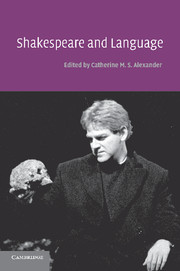Book contents
- Frontmatter
- Contents
- List of contributors
- Editor's note
- 1 Shakespeare and language: an introduction
- 2 Shakespeare's language and the language of Shakespeare's time
- 3 The foundations of Elizabethan language
- 4 Shakespeare's talking animals
- 5 Some functions of Shakespearian word-formation
- 6 Shakespeare and the tune of the time
- 7 Shakespeare's Romeo and Juliet: the places of invention
- 8 Shakespeare's thematic modes of speech: Richard II to Henry V
- 9 Hamlet and the power of words
- 10 The art of the comic duologue in three plays by Shakespeare
- 11 Hamlet's ear
- 12 ‘Voice potential’: language and symbolic capital in Othello
- 13 The aesthetics of mutilation in Titus Andronicus
- 14 ‘Time for such a word’: verbal echoing in Macbeth
- 15 Household words: Macbeth and the failure of spectacle
- 16 Late Shakespeare: style and the sexes
- Index
2 - Shakespeare's language and the language of Shakespeare's time
Published online by Cambridge University Press: 15 December 2009
- Frontmatter
- Contents
- List of contributors
- Editor's note
- 1 Shakespeare and language: an introduction
- 2 Shakespeare's language and the language of Shakespeare's time
- 3 The foundations of Elizabethan language
- 4 Shakespeare's talking animals
- 5 Some functions of Shakespearian word-formation
- 6 Shakespeare and the tune of the time
- 7 Shakespeare's Romeo and Juliet: the places of invention
- 8 Shakespeare's thematic modes of speech: Richard II to Henry V
- 9 Hamlet and the power of words
- 10 The art of the comic duologue in three plays by Shakespeare
- 11 Hamlet's ear
- 12 ‘Voice potential’: language and symbolic capital in Othello
- 13 The aesthetics of mutilation in Titus Andronicus
- 14 ‘Time for such a word’: verbal echoing in Macbeth
- 15 Household words: Macbeth and the failure of spectacle
- 16 Late Shakespeare: style and the sexes
- Index
Summary
Many things are true which only the commonest minds observe.
Then I think the commonest minds must be rather useful.
Middlemarch, Book I, chapter 5Shakespeare is our most underrated poet. It should not be necessary to say that, but it is. We generally acknowledge Shakespeare's poetic superiority to other candidates for greatest poet in English, but doing that is comparable to saying that King Kong is bigger than other monkeys. The difference between Shakespeare's abilities with language and those even of Milton, Chaucer, or Ben Jonson is immense. The densities of his harmonies – phonic and ideational both – are beyond comfortable calculation, are so great that the act of analysing them is self-defeating, uncovers nests of coherence that make the physics of analysed lines less rather than more comprehensible.
The reason it is necessary to point out Shakespeare's poetic superiority to competing poets is, I think, that we have so long, so industriously ignored the qualities in literature that drew us to it in the first place. As a result, we – or, at any rate, the scholarly books and essays we write and read – and our students treat a Shakespeare play or Paradise Lost or Huckleberry Finn or even ‘Kubla Khan’ as if we valued it for its paraphrasable content or as a source of information about the time and society that spawned it or about its author.
- Type
- Chapter
- Information
- Shakespeare and Language , pp. 18 - 43Publisher: Cambridge University PressPrint publication year: 2004



